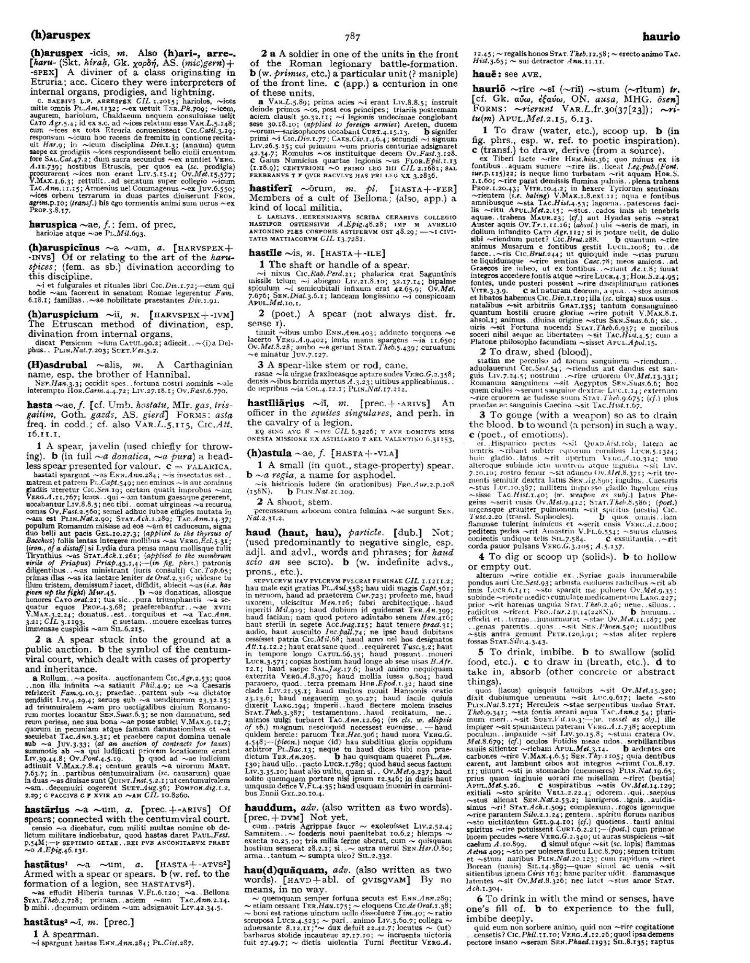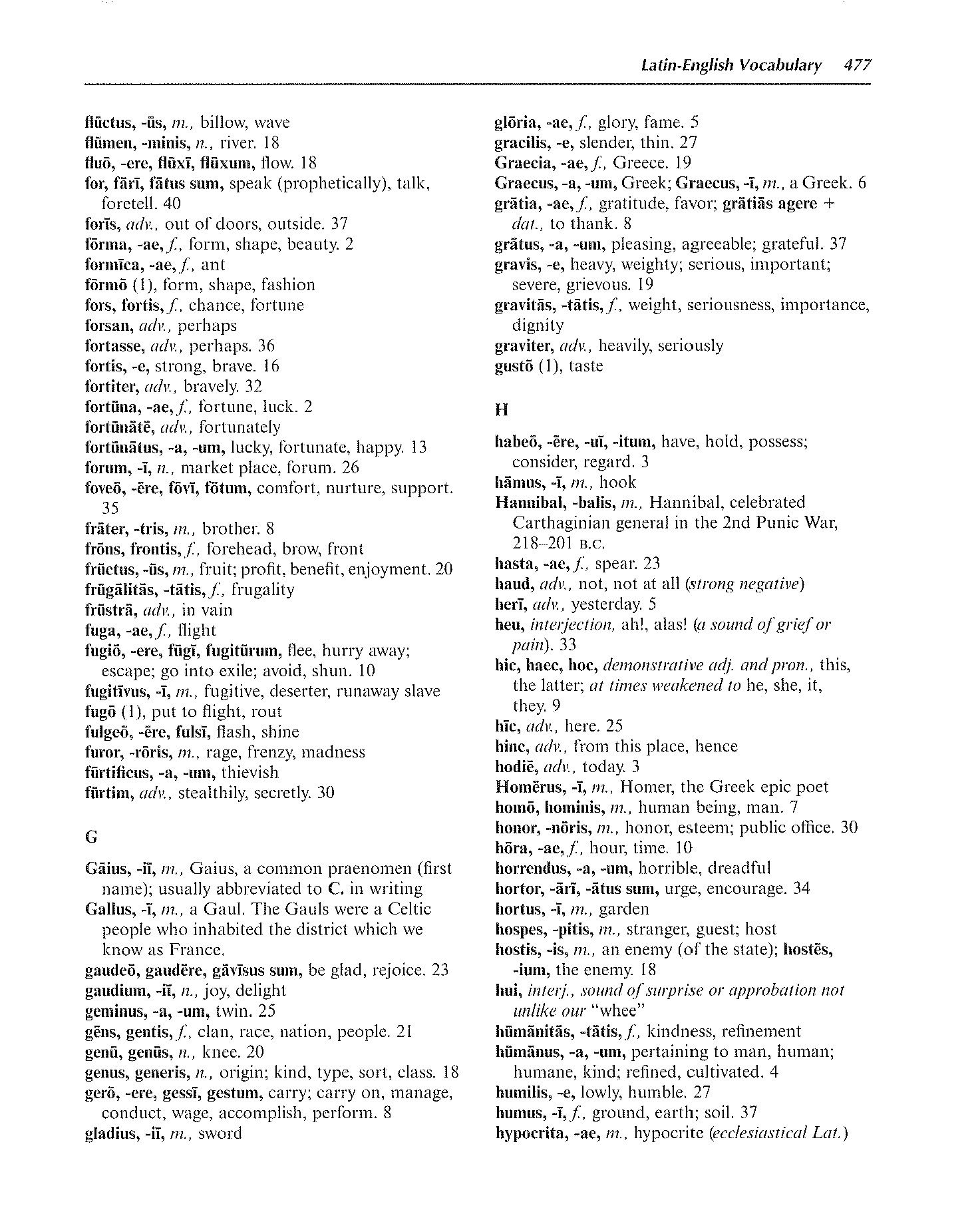
page_listing.tpl
page_subListingDetails.tpl
sub_listingDetails_style1.tpl
sub_listingDetails.title.tpl
haud not
haud is a Latin Adverb that primarily means not.
Definitions for haud
Wheelock's Latin
Adverb
- 1
not, not at all (strong negative)
Oxford Latin Dictionary
Particle
- 1
Not; (used predominantly to negative single, esp. adjl. and advl., words and phrases. (b) (w. indefinite advs., pron., etc.).
Sentences with haud
Latin to English
Est enim amicitia nihil aliud nisi omnium divinarum humanarumque rerum cum benevolentia et caritate consensio, qua quidem haud scio an excepta sapienta nil quicquam melius homini sit a dis immortanlibus datum. (De Amicitia, 20)Compare Friendship is nothing else than an accord in all things, human and divine, conjoined with mutual goodwill and affection, and I am inclined to think that, with the exception of wisdom, no better thing has been given to man by the immortal gods.
Quoniam rectus consilium haud bene evenio, pravus utor coepi.Compare Since just plans had not turned out well, he began to use base ones.
Haud equidem abnuo egregius dux sum Alexander.Compare I indeed do not deny that Alexander was an excellent general.
Elephantus inter duo acies versor, velut incertus quis sum, haud dissimiliter navis sine gubernaculum vagus.Compare The elephants began to move to and fro between the two armies, as if uncertain to whom they belonged, not unlike ships drifting without a helm.
Data sources
Notes
- Definitions
- Frederick M. Wheelock, Wheelock's Latin, 6th ed., rev. Richard A. LaFleur (New York, NY: HarperCollins Publishers, 2005): 477.
- P. G. W. Glare, Oxford Latin Dictionary, Vols. 1-8 (Oxford: Clarendon Press, 1982): 787.
- Word frequencies
- Christopher Francese, "Latin Core Vocabulary," Dickinson College Commentaries, last modified 2014, http://dcc.dickinson.edu.
- Paul B. Diederich, The Frequency of Latin Words and Their Endings, PhD diss., (Columbia University, 1939).
- Louis Delatte, Suzanne Govaerts, Joseph Denooz, and Etienne Evrard, Dictionnaire fréquentiel et index inverse de la langue latine [Frequency Dictionary and Inverse Index of the Latin Language] (Liège, Belgium: Laboratoire d'analyse statistique des langues anciennes de l'Université de Liège [L.A.S.L.A.], 1981): 120.
Bibliography
Allen, Joseph H. Allen and Greenough's New Latin Grammar for Schools and Colleges: Founded on Comparative Grammar. Edited by James B. Greenough, George L. Kittredge, Albert A. Howard, and Benjamin L. D'Ooge. Boston, MA: Ginn & Company, 1903.
Crystal, David. A Dictionary of Linguistics and Phonetics. 6th ed. Oxford, UK: Blackwell Publishing, 2008.
Delatte, Louis, Suzanne Govaerts, Joseph Denooz, and Etienne Evrard. Dictionnaire fréquentiel et index inverse de la langue latine [Frequency Dictionary and Inverse Index of the Latin Language]. Liège, Belgium: Laboratoire d'analyse statistique des langues anciennes de l'Université de Liège (L.A.S.L.A.), 1981.
Diederich, Paul B. The Frequency of Latin Words and Their Endings. PhD diss., Columbia University, 1939.
Francese, Christopher. "Latin Core Vocabulary." Dickinson College Commentaries. Last modified 2014. http://dcc.dickinson.edu/latin-vocabulary-list.
Gildersleeve, Basil L., and Gonzales Lodge. Gildersleeve's Latin Grammar: Third Edition, Revised, and Enlarged. 3rd ed. London, England: Macmillan and Co., 1903.
Glare, Peter G.W. Oxford Latin Dictionary. Vols. 1-8. Oxford, England: Clarendon Press, 1982.
Krüger, Bernd. "Latin Conjugation Tables." Cactus2000. Accessed May 5, 2023. https://latin.cactus2000.de/index.en.php.
Pierson, Nick. "Sound of Text." Accessed October 26, 2019. https://soundoftext.com.
Wheelock, Frederick M. Wheelock's Latin. 6th ed. Revised by Richard A. LaFleur. New York, NY: HarperCollins Publishers, 2005.
Wiktionary Contributors. "Victionarium." Wikimedia Foundation, Inc. Updated March 18, 2019. https://la.wiktionary.org/wiki/Victionarium:Pagina_prima.
Citation
Chicago (17th ed.)
Allo Contributors. "haud (adv.) - Latin Word Definition." Allo Latin Dictionary. Last modified . Accessed February 20, 2026. http://ancientlanguages.org/latin/dictionary/haud.
Entry created on . Last updated on .







